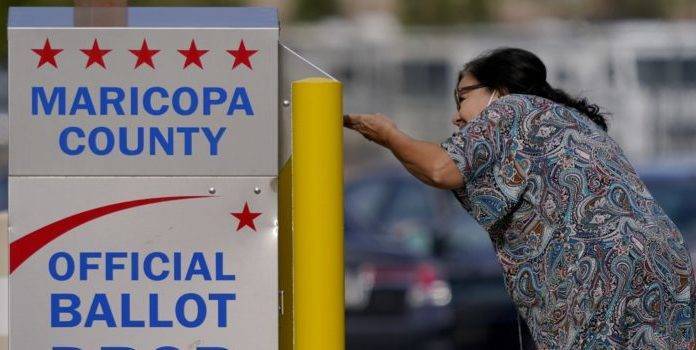(Jacob Bruns, Headline USA) In order to try to address the flood of mail-in and absentee ballots on Election Day, Maricopa County, Arizona, has hired a company to help it breeze through its ballot verification process, the AZ Mirror reported.
In light if the county’s past issues with its haphazard handling of ballots, however, some are questioning what level of vetting and scrutiny the company Runbeck, will be subjected to, and whether it may be yet another ploy for county officials to dodge accountability if a flood of fake ballot mysteriously contaminates the count.
Runbeck, a ballot printing and processing company, will put the ballots through its high-speed counting machines, ostensibly as part of the county’s ongoing attempts to avoid repeats of the 2020 and 2022 elections, both of which were marred by widespread irregularities.
An independent forensic audit commissioned by the state Senate raised a litany of issues concerining the intake and chain-of custody for mail-in ballots, as well as the ink and paper quality used on the ballots at polling stations. It was unable to complete its examination of the voting softwar and equipment due to resistance from county and state officials, who refused to supply the requested passwords and lacked candor in what they did provide.
Despite the damning observations, the same election officials again bungled the 2022 race, during which many of the voting machines jammed on Election Day due to improperly sized paper. The county took an inordinately long time tallying its results, with questions along the way about chain-of-custody issues, which spurred a series of lawsuits from losing GOP gubernatorial candidate Kari Lake about the suspicious circumstances.
For the 2024 election, Runbeck and county officials claimed already to have begun renovating the county’s ballot-verifying site in order to increase counting efficiency, particularly to address the massive influx of Election Day mail-in ballot drop offs, which are expected to increase from approximately 290,000 in 2022 to 350,000 in 2024.
According to Runbeck, the verification machines cost about $1 million each, and the county would need several of them, plus additional staff to operate and maintain the machines.
Scott Jarrett, Maricopa’s director of Election Day voting, said the investment in the Phoenix-based company was part of the county’s desire to continuously improve its processes.
Nonetheless, there have been concerns about the fact that the county was contracting out such an important task to a private company, particularly given the recent history of technological blips during elections.
Don Hiatt, a candidate for Maricopa County recorder, wondered, “Why is this being outsourced to a private company? Why doesn’t the county own this machine?”
Democratic Party observer Ed Giebel, in contrast, was encouraged by Runbeck’s verification process.
“It’s not like you can inject 5,000 ballots into the process,” he said.
Giebel’s thoughts were echoed by Republican State Rep. Alex Kolodin, who said that he was “a lot less concerned about Runbeck” than he was before his investigation of their process.
“Eyes on the process is always the best way to avoid problems,” he concluded.
Headline USA’s Ben Sellers contributed to this report.

